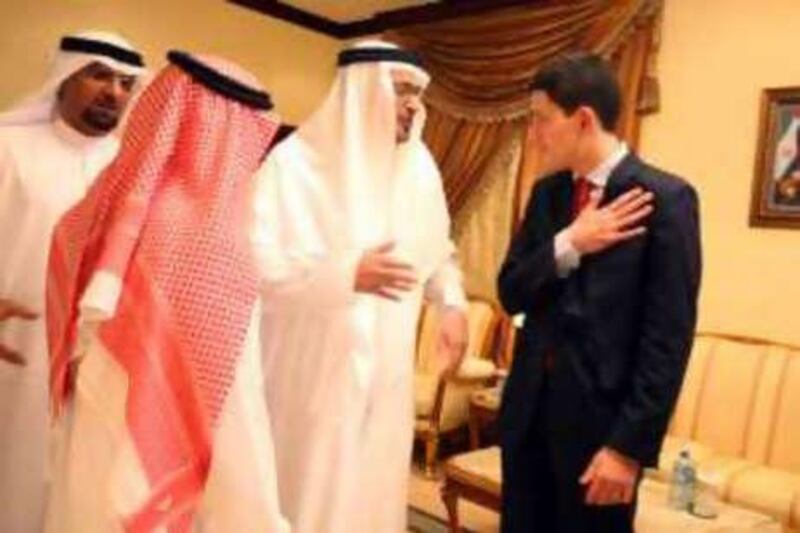Abu Dhabi // Iran's nuclear ambition is the biggest threat to world security and Gulf states, including the UAE, must take a tougher stance against the nation to head off an arms race in the Middle East, David Miliband, the British foreign secretary, said yesterday. Capping his visit to the capital yesterday, Mr Miliband stressed that Gulf countries must implement UN Security Council-backed sanctions and clamp down on smuggling if they wanted an end to the Iranian uranium enrichment programme that threatens to spark proliferation throughout the region.
"It's clear that 2009 will be an important year with respect to the Iranian nuclear programme and it's important that all of us that have concerns should do everything in our power to produce a change in policy," he said at Abu Dhabi International Airport before departing. The sanctions laid out in the UN resolutions, he said, were the "place to start". Mr Miliband, who met Sheikh Khalifa bin Zayed, President of the UAE and Ruler of Abu Dhabi, and Sheikh Abdullah bin Zayed, the Foreign Minister, during his one-day visit, also said a nuclear-armed Iran would be a "decisive blow" against those seeking a pragmatic and peaceful solution to region's problems.
He added that the Arab world had been sidelined from the Middle East peace process for too long. "The threat from nuclear weapons is by definition the most deadly," he said. "The acquisition of a nuclear weapon would strengthen Tehran's regional position, injecting its attempts to stoke up division and promote instability with much greater confidence," Mr Miliband said in a wide-ranging policy speech at the Emirates Centre for Strategic Studies and Research in Abu Dhabi earlier in the day. "The consequent nuclear arms race would be very dangerous. All those who recognise the dangers of alternatives to the diplomatic route realise that we need to make the diplomatic route work by engaging with it very fully." Mr Miliband said it was up to Iran to accept an offer of economic, scientific, political and civil nuclear collaboration, or risk the consequences. However, Dr Hans Blix, the chairman of the Weapons of Mass Destruction Commission, an independent body based in Stockholm, said the US and other western powers were taking the wrong tack in their efforts to persuade Iran to forego its controversial enrichment programme. "I think the states that have negotiations with Iran have some good ideas, but two elements are missing: there have been no assurances that Iran will not be attacked, and they should not insult Iran," he said on the sidelines of a nuclear conference in Abu Dhabi. Only the US could provide Iran with credible assurances regarding its national security and sovereignty. To make progress in discussions on Iran's nuclear programme, Washington would also need to provide a commitment that it would not seek to change the Islamic republic's regime, Dr Blix said. The controversy over Iran's nuclear ambitions has direct relevance to other Gulf states that are seeking to develop civilian nuclear power, Dr Blix said, because it is undermining the credibility of their programmes in the eyes of potential western partners. While not explicitly disputing the US claim that Iran has a covert nuclear arms programme, he said most countries taking the nuclear weapons route do so because they perceive a direct threat of attack from outside. But, "in Iran's case, I do not see that it is there", he said. Iraq, in its current state, is no longer a threat to its neighbour, and even Israel would not attack if Iran agreed not to continue its nuclear enrichment activities, Dr Blix added. But another motive for pursuing nuclear weapons development is international prestige, he noted. "For that reason, diplomatic relations are important." Mr Miliband said Gulf states such as the UAE could play a vital role in preventing Iran from becoming a nuclear power as they were in the position to wield restrictions, as well as offer rewards for good behaviour, and urged them to take more decisive action. Tehran maintains that its atomic programme is for the peaceful production of energy. The foreign secretary's speech comes days after a report by the International Atomic Energy Agency, which claimed that Iran had not suspended its nuclear enrichment programme. The agency also said its investigation into nuclear facilities was at a "deadlock". Mr Miliband described the report, which said Iran now had 630kg of enriched uranium, as "very worrying". The UAE has been pushing for a more prominent role in the West's dealings with Iran. Last week, Dr Anwar Gargash, the Minister of State for Foreign Affairs, urged Barack Obama, the US president-elect, to allow the UAE to help in any future talks. Mr Miliband held up the UAE's civil nuclear programme as a "gold standard" and example for other GCC states. The British government wants the two countries to form a close partnership as Britain looks to redevelop its nuclear power industry and as the Emirates begins its own. Mr Miliband's visit follows a two-day trip to Abu Dhabi and Dubai by Gordon Brown, the British prime minister, earlier this month, as part of a Gulf tour. lmorris@thenational.ae * With additional reporting by Tamsin Carlisle






